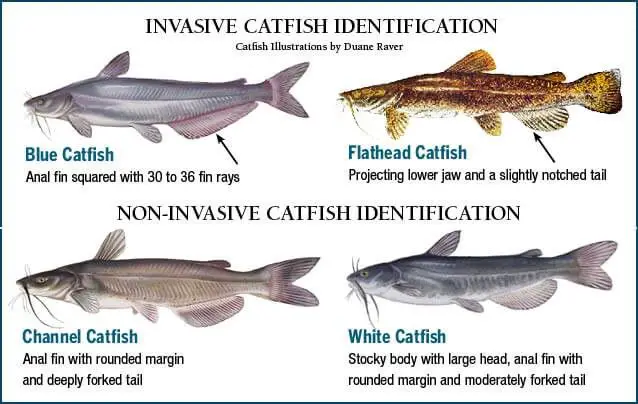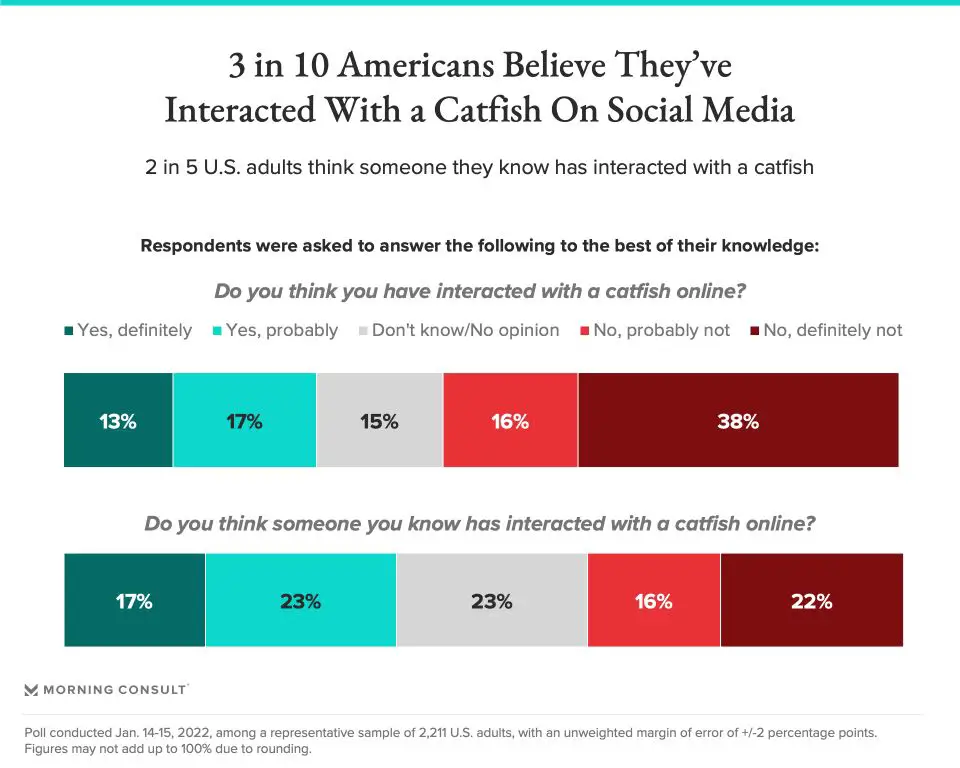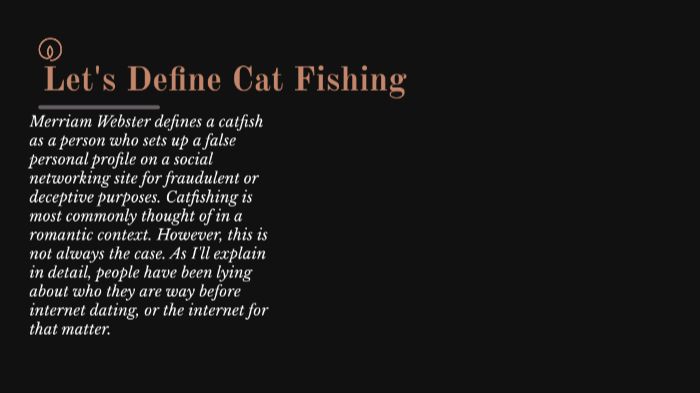What is catfishing?
Catfishing refers to the practice of creating a fake online identity, typically for deceptive purposes. The term originated from the 2010 documentary Catfish, which followed a man who discovered the woman he met online and developed an emotional relationship with was not who she claimed to be [1].
According to Merriam-Webster, to catfish means “to deceive (someone) by creating a false personal profile online” [2]. A catfish sets up social media profiles using someone else’s photos and false biographical information. They initiate relationships through these fake identities.
The motivations for catfishing include loneliness, insecurity, the desire for companionship, revenge, stalking, and financial fraud. Catfishing violates the trust of the victim and can have damaging psychological effects. Treatment options are available for both victims and perpetrators to address underlying mental health issues.
Types of Catfishing

There are several common types of catfishing:
Romantic Catfishing
Romantic catfishing is one of the most common types and involves creating a fake dating profile to pursue a fraudulent online relationship (The 5 Types of Catfishers You May Encounter Online). The catfisher pretends to have romantic feelings and misleads the victim into thinking they are in a real relationship. This is done to manipulate the victim emotionally or financially.
Financial Catfishing
Financial catfishing schemes aim to scam people out of money. The catfisher invents hardships like medical bills or car troubles, gaining the victim’s trust and sympathy before asking for money (8 Types of Catfish on Catfish). Victims may feel compelled to help someone they care about and end up sending the catfisher funds.
Catfishing for Fame
Some catfishers create fake identities of celebrities, public figures or other influential people. They may try to use that borrowed fame to lure in victims, promote causes or products, or just enjoy the attention (8 Types of Catfish on Catfish). This type of catfishing is often easy to spot as public figures are wary of contacting strangers online.
What is scamming?
Scamming refers to fraudulent or deceptive acts aimed at exploiting victims for financial gain or other benefits. According to Merriam-Webster, a scam is “a fraudulent or deceptive act or operation.” Scams often involve misleading claims, pressure tactics, or outright theft and illegal activity.
Some of the most common types of scams include:
- Phishing scams, where perpetrators pose as legitimate organizations via email or websites to steal personal information.
- Get-rich-quick scams promising easy money for little work.
- Romance scams, preying on people seeking relationships online.
- Fake invoices demanding payment for services never rendered.
- Lottery and prize scams informing victims they’ve won a contest they never entered.
- Tech support scams offering to fix nonexistent computer issues for a fee.
- Identity theft to open fraudulent accounts in the victim’s name.
Scammers exploit human psychology via social engineering. Common techniques include creating a sense of urgency, promising rewards, and claiming to be a trusted authority. Sadly, even vigilant people can fall victim under the right circumstances.
Differences between catfishing and scamming

There are some key differences between catfishing and scamming in terms of intentions and goals, legality, and harm caused.
Catfishing typically involves creating a fake online identity and leading someone on emotionally in order to form a relationship. The catfisher may be looking for attention, affection, intimacy or control over someone else (https://www.quora.com/Whats-the-difference-between-a-scammer-and-a-catfisher). Scamming often has financial or material goals, seeking to defraud someone out of money, gifts, or sensitive information.
While both catfishing and scamming involve deception, scamming is often outright illegal while catfishing occupies more of an ethical gray area. Scams involving fraud, theft, or identity theft are punishable crimes. There are few laws directly addressing catfishing itself.
In terms of harm, financial scams can destroy people’s savings and credit. The emotional harm from catfishing can be trauma from deception, loss of trust, and damage to the victim’s relationships or reputation. However, catfishing may be considered more psychologically manipulative while scams are focused on material gain (https://www.investopedia.com/terms/c/cat-fishing.asp).
Similarities between catfishing and scamming
While catfishing and scamming have some key differences, there are certainly some core similarities between the two as well. Both catfishing and scamming involve an element of deception in order to manipulate or take advantage of someone. The catfisher creates a fake persona and identity, often using someone else’s photos and information. The scammer also misrepresents themselves, frequently promising something they have no intention of delivering on.
In both catfishing and scamming, the ultimate goal is often financial gain. The catfisher may ask for gifts or money from their victims, while the scammer is focused directly on bilking funds out of their marks. Beyond just money, there is an emotional component as well. Catfishing victims may feel emotionally invested and manipulated once the truth comes out. Scam victims can feel a similar sense of betrayal when the scam is revealed and anger at being duped.
So in summary, the core similarities between catfishing and scamming come down to the deception involved, the potential for financial and emotional harm, and the manipulation of innocent people. While their methods and specific approaches differ, at the heart both catfishing and scamming show a disregard for being truthful and not taking advantage of others.
Is catfishing illegal?
Legally speaking, catfishing itself is not necessarily a criminal offense. Catfishing involves creating a fictional persona online and engaging with others under false pretenses. While immoral, catfishing is not illegal in most cases.
However, certain criminal charges may apply depending on the specifics of the catfishing:
- Identity theft – Using someone else’s identity without permission is illegal.
- Fraud – Deceiving someone for financial gain is fraud.
- Cyberstalking – Repeatedly harassing someone online may constitute stalking.
- Sextortion – Coercing someone into sending sexual content is illegal.
So while basic catfishing for romance or attention is not a crime, catfishing that causes harm or involves other illegal activity can lead to criminal charges. The legal system is still catching up to address catfishing, but depending on the extent of deception and damage caused, catfishers may face lawsuits or prosecution.
It’s important to be aware of the potentially illegal aspects of catfishing. If you are being catfished maliciously or someone is impersonating you illegally, consult a lawyer to understand your options for legal recourse.
Psychology of Catfishing
Catfishing often stems from loneliness and a desire for connection. People who catfish may feel socially isolated or crave intimacy that is lacking in their real lives (Discover Magazine). Catfishing allows them to fulfill unmet emotional needs by creating an imaginary relationship. The catfisher gains confidence and satisfaction from the online interactions, even though they are based on deception.

Certain personality traits are also associated with catfishing. Catfishers tend to be manipulative and seek attention or admiration. They often have low self-esteem and use catfishing to compensate by portraying themselves as more attractive or successful online. Some catfishers exhibit narcissistic tendencies, needing constant validation from their victims. Others may be psychopathic with a lack of empathy. Understanding the psychological motivations behind catfishing can help prevent and address this harmful behavior.
How to avoid being catfished
There are certain red flags to watch out for that may indicate someone is attempting to catfish you. According to PCMag, some warning signs include profile photos that look overly retouched, inconsistent details in photos, reluctance to video chat, and excuses for not meeting in person.
To avoid falling victim, it’s important to verify the identity of anyone you meet online before developing a relationship. The FBI recommends doing reverse image searches on profile pictures to see if they show up elsewhere online. You can also look up phone numbers, email addresses, and social media profiles to check if they’re consistent. Asking for details about where they work, live, or go to school can help fact check their story. If anything seems suspicious, confront them directly and ask for proof of identity or simply cease contact.
Proceeding with caution and not ignoring red flags are key to avoiding being manipulated or scammed by a catfish. According to Malwarebytes, taking things slow and listening to your instincts can help you avoid developing feelings for a fabricated identity.
Dealing with the aftermath of catfishing
If you discover you’ve been catfished, it’s important to take steps to report the catfisher and get any help you need recovering emotionally.
Reporting catfishing
While catfishing itself is not illegal in most places, some catfishing behaviors like identity theft or financial scams can be reported to authorities. You may be able to file reports with websites or apps where catfishing occurred. According to Cybersmile, you can report catfish accounts and content to platforms so they can investigate and potentially remove those accounts.
If money was stolen from you, you can file reports about fraud with agencies like the FBI’s Internet Crime Complaint Center according to the Cyber Helpline. Stolen identity used for catfishing may also be reported to the FTC.
Recovering from emotional trauma
Being catfished can lead to emotional distress like feelings of violation, anger, sadness, confusion and loss of trust. According to the Cyber Helpline, counseling can help process these emotions, regain self-esteem and move forward in new relationships. They advise limiting contact with the catfisher, focusing on self-care and relying on trusted friends for support during the healing process.

Conclusions
In summary, while catfishing and scamming share some common elements and often go hand-in-hand, there are key differences between the two. The main difference is that catfishing involves assuming a fake identity, whereas scamming focuses more on extracting money or resources from victims. Both can be illegal and unethical, but catfishing does not always involve financial fraud like classic scams do.
While many catfishers also employ scam tactics to manipulate their victims once contact has been made, scamming can happen without elaborate fake identities being created. Some forms of catfishing are driven more by the desire for companionship or emotional validation rather than explicit financial gain. However, the lines often blur, and catfishing frequently transitions into scams over time as the catfisher seeks to profit from their schemes.
In conclusion, while catfishing and scamming are distinct in some ways, they also substantially overlap in tactics and motivations. Catfishing could be considered a specific type of scam that depends on elaborately false online identities, but not all scams involve catfishing. However, many high-profile catfishing cases ultimately become scams or involve fraudulent elements. So while not exactly the same, neither are they completely separate phenomena.
